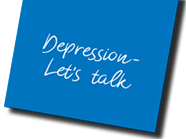What is depression?
Depression is a real disease
- Depression is a serious condition
- Depression is not stress or merely feeling unwell
- Depression is not simply a psychological disorder
- Depression is a mental disorder
- Depression is a systemic illness
- Depression is a common disorder
- Depression can affect anyone
- Depression might be recurrent or chronic
Can depression affect me?
Actually, yes, depression can affect young people. In fact, a large number of first depression episodes appear during adolescence, as well as most mental disorders.
Onset usually during childhood
- Pervasive developmental disorder/autism
- Attention deficit & hyperactivity disorder
- Anxiety disorder
- Obsessive-compulsive disorder
Onset usually during adolescence
- Substance abuse
- Anorexia nervosa
- Major depressive disorder
- Bipolar disorder
- Schizophrenia
- Bulimia nervosa
How common are mental disorders in youth?
In terms of its frequency, severity and risk for suicidal acts, depression is the most important mental disorder that can occur in adolescence though anxiety disorders are more frequent. Neuropsychiatric conditions are the most burdening mental health problems in adolescence.
If you think of your classroom, with about 30 of your peers, on average 2 of them will have depression, 3 of them will have some kind of anxiety disorder and 1 of them will have ADHD. Other mental disorders are rare.
Prevalence of Mental Disorders in Young People
Population Prevalence
- Depression (6%)
- Psychosis (1%)
- Anxiety Disorders (10%)
- ADHD (4%)
- Anorexia Nervosa (0,2%)
- Total (15-20%)
Translation to the "average" classroom
(ca. 30 students)
- Depression (2)
- Psychosis (rare)
- Anxiety Disorders (3)
- ADHD (1)
- Anorexia Nervosa (rare)
- Total (4-5)
Why do some adolescents develop depression?
A number of reasons associated with being an adolescent can make young people more predisposed to develop a depressive disorder:
- adolescence is a process of transition between childhood and adulthood;
- adolescence is a stage of human development where brain maturation and social challenges increase exponentially;
- adolescence is a stage of psychosocial development where the construction of identity, the search for autonomy, and experiencing novelties can produce new risks and losses.
Parents, teachers and peers frequently do not recognise that an adolescent suffers from depression.
Most of the time, changes are not interpreted as possible clues to mental disorders and depression, and are seen as mere markers of the adolescent phase.



